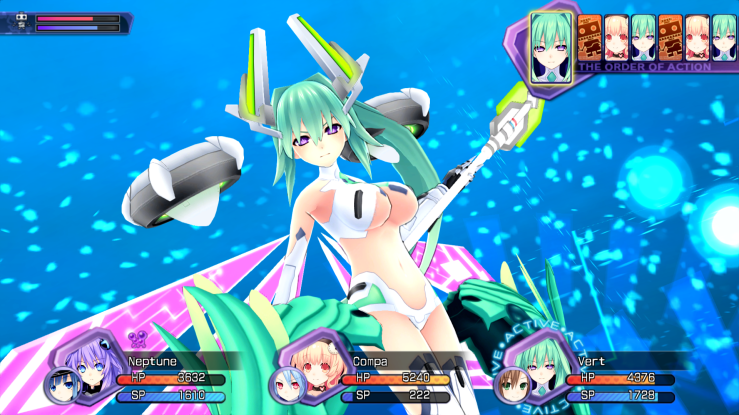
For the majority of gamers, difficulty settings are little more than a stepping stone – one more screen to smash X through before getting into the new game they just bought. They put the game on the pre-selected ‘medium’ or ‘normal’, blink through the “You can change this at any time in the options” message, and soon forget there even was a difficulty setting to begin with. Outside of the occasional novelty names some developers give their settings, like MGS IV’s confusing ‘Naked Normal’ and ‘Solid Normal’ difficulties, game devs rarely ever break the mold when it comes to creating separate difficulties in their games.
Hyperdimension Neptunia Re;Birth1, a game I’ve been playing ever since I wrote “Guilty Pleasure Games”, approaches difficulty a bit differently. There are no modes or options in the settings like you’re used to seeing in most modern titles. Instead the game uses its own mechanics to allow gamers to tweak the difficulty at will within the game’s narrative scope.
Shortly after smacking your first few monsters around, Re;Birth1 introduces the player to Plans – craftable modifications you create with materials monsters drop in order to change aspects of the game. It’s an aspect closely tied to the game’s overall narrative, a premise that includes a ‘Console War’ for the right to rule ‘Gamindusri’ (pronounced ‘game industry’). The Plans essentially act like mini mods to the game that you can turn on and off as you desire, and two of the first few you get are ‘Fortify Enemies’ and ‘Weaken Enemies’.

It’s an ingenious way to create difficulty settings within the game’s narrative scope, placing the options within the game’s mechanics instead of hiding it away in the options menu. A little later in the game you also get an Exp Up Plan and various other options that allow you to tailor the game as you see fit.
Imagine if more developers took this same approach. What if in the Witcher 3 you could do a quest to contaminate the water in a given area to weaken the creatures? Or maybe instead you choose to add nutrients that promotes growth throughout the region to make everything stronger? Not only would that give you game choices that impact your experience more than just about any in-game choice ever has, it also builds the world and makes it feels alive.
The idea isn’t applicable to every game ever made – especially not in today’s multiplayer dominate industry – but it’s a simple change that can drastically improve someone’s overall experience. Instead of going through the options and admitting defeat, players can go through a quest or implement an in-game mechanic to affect the game instead. The only reason not to do this, at least in RPGs that have difficulty settings, would be due to sheer laziness and/or lack of creativity.

“Neat, but who cares?”
Not everyone has to care. Most people who come across this article will probably roll their eyes and move on before getting to this section – and that’s fine. If you’re not planning to ever work in the games industry then thinking about these things is more or less a waste of your time.
I’m a fan of the ‘Student of the Game’ approach. It’s a philosophy often mentioned directly in rap and hip-hop culture but exists as an idea throughout all creative industries. Writers read books, directors watch movies, game devs play games, etc etc. The best way to hone your craft is to immerse yourself in it, discovering new ideas and aspects that others before you have attempted and trying to understand what does or doesn’t work.
It’s a mindset more indie developers need. I’ve seen so many crap games come out that look like they were made by people who’ve never picked up a video game in their life – and 2016 saw more garbage like that hit Steam’s market than ever before.
I plan to work in game development someday. The way Hyperdimension Neptunia Re;Birth1 approaches difficulty is worth noting and keeping in mind. Sure it’s not a perfect game by any means – I’ll cover its successes and shortcomings at length when I write the review – but it still has lessons to teach those willing to pay attention.
(And I felt bad about not posting anything during the last week, so here you go! Hope to enjoy it. It’s late and I’m going to back to the game now. Bye!)